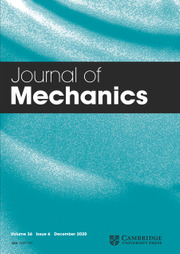Article contents
Stress Wave Propagation for Nonlinear Viscoelastic Polymeric Materials at High Strain Rates
Published online by Cambridge University Press: 05 May 2011
Abstract
Without knowing the dynamic constitutive relation of materials under high strain rates, no wave propagation can be correctly analyzed. A Series of experimental and theoretical investigation at high strain rates revealed that the nonlinear viscoelastic behavior of polymers and the related composites are well described by the Zhu-Wang-Tang (ZWT) nonlinear viscoelastic constitutive equation. The impulsive reponse of ZWT materials consists of a rate independent nonlinear elastic response and a high frequency linear viscoelastic response. The dispersion and attenuation of nonlinear viscoelastic waves mainly depend on the effective nonlinearity and the high frequency relaxation time θ2. An “effective influence distance” or “effective influence time” is defined to characterize the wave propagation range where θ2 dominates the impact relaxation process.
- Type
- Articles
- Information
- Copyright
- Copyright © The Society of Theoretical and Applied Mechanics, R.O.C. 2003
References
REFERENCES
- 10
- Cited by


